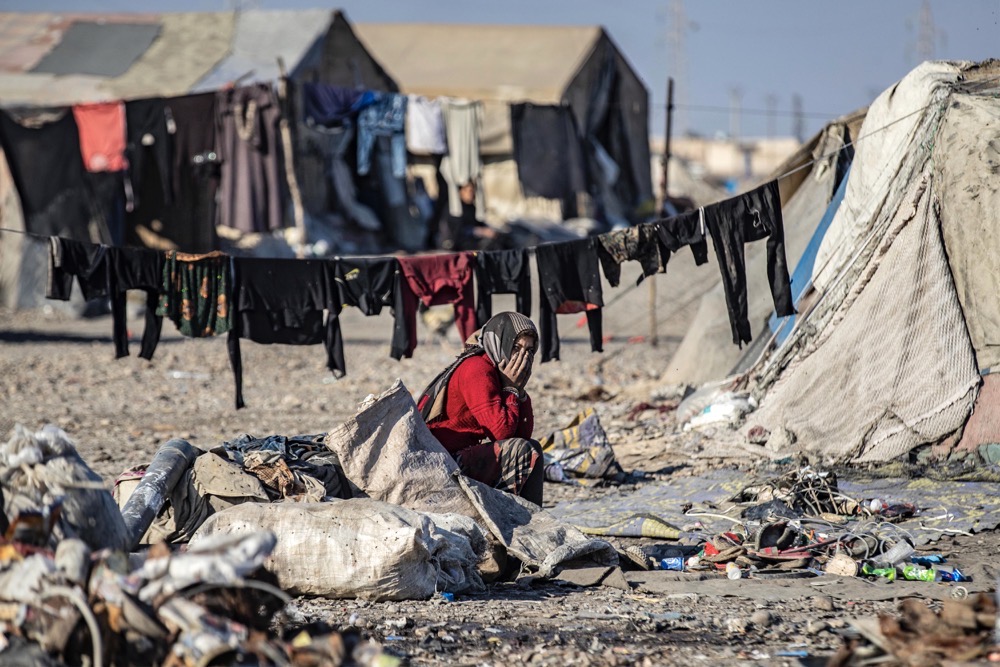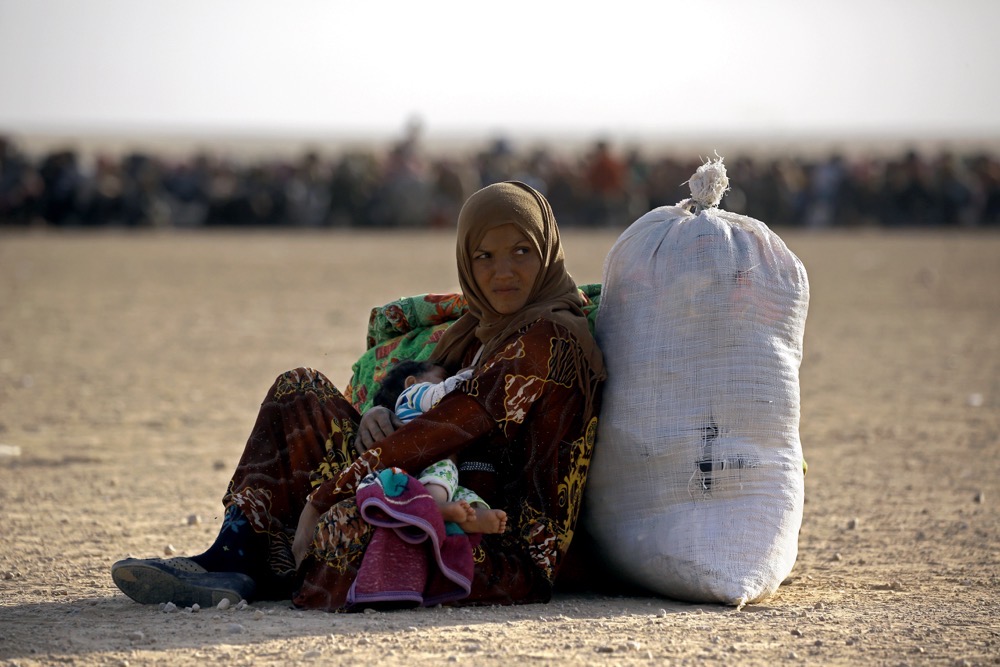Ignoring health and hygiene issues highlights gender inequality in Middle East displacement camps
London: Every month, women and girls living in displaced people’s camps face a common challenge – a natural phenomenon that disrupts their daily lives, from queuing for food to participating in social life.
A relatively neglected health issue, aid agencies say poor use of menstrual hygiene products is affecting the lives of millions of people in crisis-hit areas of the world, exacerbating the gender gap.
“Lack of access to menstrual hygiene products and facilities can be a major barrier for displaced women and girls to participate in training programs and other activities,” said Samara Atassi, CEO and founder of Women-Led Cross-Border Organization Syriaat. A charity that supports refugees and displaced people in Jordan, Syria and the UK.
Lack of adequate access to such products and facilities often forces women and girls to engage in “unhygienic practices, using dirt, leaves or sand to manage their periods,” Atassi told Arab News.
Social isolation and shyness often pose an additional challenge, leading to “feelings of isolation and shame,” which psychologically undermine their well-being, she said. Overcrowding in camps, in particular, “can lead to a lack of dignity and privacy, and can also affect mental health.”
Issues such as access to clean water, sanitation and personal hygiene make the problem worse.

A woman sits outside a tent in a camp for displaced people in the countryside near the northern Syrian city of Raqqa. (AFP/File)
These conditions “make it difficult to control menstrual hygiene, increasing the risk of infection and other health problems,” Sahar Yassin, Oxfam’s MENA regional gender advocacy advisor, told Arab News.
“Period poverty” is defined as lack of access to menstrual products, education, hygiene, waste disposal, or a combination of these.
In the year In 2019, academic institutions, NGOs, governments, UN agencies and other experts came together to form the Global Menstruation Coalition to investigate the issue. He defined menstrual health as “not merely the absence of disease or injury associated with the menstrual cycle, but a state of complete physical, mental, and social well-being.”
It was pointed out that people should get information about menstruation, life changes and hygiene, the ability to take care of themselves during menstruation, water, sanitation and hygiene services.
It also highlighted the importance of having access to menstrual cycle disorders and health care, a positive, supportive environment to make informed decisions and being able to participate in all aspects of life, such as going to work. and school.
Contemporary poverty affects an estimated 500 million people worldwide – but is perhaps felt most acutely by those who have come of age, either forcibly displaced from their homes or living in overcrowded and poorly equipped camps.
According to the United Nations refugee agency, women and girls account for 50 percent of the displaced or stateless population.
In the year By the end of 2021, the Middle East and North Africa is home to nearly 16 million forcibly displaced and stateless people, with the largest number fleeing conflicts in Syria and Yemen, according to UNHCR data.
However, the reproductive health of women and girls in refugee and internally displaced camps continues to be neglected by donors. According to a 2019 study by UNHCR, 55 percent of women’s needs are met in relation to menstrual products.
Nicola Banks, Advocacy Manager at the UK-based charity Charity for Humanity, told Arab News that the UK had recently cut funding for its flagship program on sexual and reproductive health, Women’s Integrated Sexual Health, which supports marginalized populations in Asia and Africa. .
“Cutting SRHR (sexual and reproductive health and rights) programs … reduces access to menstrual hygiene products, education and reproductive health services, which can exacerbate period poverty,” Banks said.

An displaced Iraqi woman who fled Mosul sits with her daughter as she waits to enter Syria. (AFP/File)
During humanitarian crises, aid and relief efforts are focused primarily on what are considered the most immediate needs – food, shelter and medicine – and menstrual hygiene products are often neglected, according to a report published in September 2022 by the United Nations Agency for Sexual and Reproductive Health. , UNFPA
Another critical challenge to menstrual hygiene is lack of education, which can lead to misconceptions about menstruation and perpetuate stigma and shame, said Atassi of Suryat Across Borders.
Due to this pervasive feeling of stigma and shame, many girls aged 10-18 in Turkish refugee camps have limited access to accurate information about menstruation, meaning few are fully aware of their period or first menstrual cycle, according to a UNFPA report.
The study “Menstrual Hygiene Management among Turkish Migrant Women and Girls” emphasizes that this important but vulnerable population lacks complete and accurate understanding of menstruation, with the primary source of information being the mother or other female family member.
Fastfact
55%
According to a 2019 UNHCR study, only 55 percent of women’s needs for menstrual products are met.
Oxfam’s Yassin said this, coupled with a lack of education and time poverty, “is closely linked to gender-based violence in the MENA region, where cultural taboos on menstruation prevent women and girls from discussing it openly, leading to misinformation and/or deprivation.” information”
Menstruation-related gender-based violence, or GBV, includes “early marriage, loss of privacy, security and sexual harassment.”
Women in displaced persons and refugee camps are often forced to work alone in isolated areas to hide their periods, exposing them to sexual violence. But the danger is also present in the toilets in the camp.
In the year In 2021, UN High Commissioner for Refugees Filippo Grandi stated that “one in five refugee or internally displaced women will experience sexual violence” and the COVID-19 pandemic has exacerbated the issue.

Syrian-Kurdish displaced women stand behind a barbed wire fence in the Kushtapa refugee camp. (AFP/File)
“In many cases, GBV is the result of SRHR violations such as female genital mutilation/cutting, child marriage, intimate partner violence and non-partner sexual violence,” Banks of Action for Humanity said.
“Education, empowerment and ending violence are critical components of gender equality and cannot be addressed in isolation from SRHR.”
Yassin told Oxfam: “By addressing period poverty and improving menstrual hygiene infrastructure and access, we can not only promote gender equality and prevent gender-based violence, but also support the health, economic empowerment and well-being of women and girls.”
Despite the efforts of many NGOs and UN agencies to alleviate the burden of periodical isolation and poverty, menstrual hygiene is still a neglected issue in refugee and IDP camps.
“As an organization committed to empowering women, we recognize the importance of providing comprehensive sexuality education,” said Atassi of Souriyat Across Borders. Unfortunately, we currently do not have an education project in the IDP camps.
But we strive to support women’s health and hygiene needs in all our fundraising campaigns.
“Even in emergency response situations like the (Feb. 6 Syria-Turkey) earthquake…we’ve made it a priority to include feminine hygiene baskets in our relief efforts.
“We believe we can help women feel supported, safe and empowered by addressing their basic needs.”
